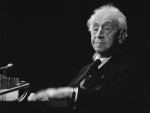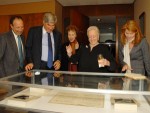Title
At his special Juilliard master class on February 12, 1975, in Paul Hall, the great pianist Arthur Rubinstein was asked why he no longer performed in Germany. His response: “That is a sad question that I have answered too often. I don’t play in Germany because I have a great respect for the dead, for 100 members of my family killed by the Nazis.” Like many other Jews of his time, Rubinstein had a complicated relationship with the country that in World War II tragically destroyed his family’s life in Europe. While he never did concertize again in Germany following the war, Rubinstein presented emotional homecoming tours in his birthplace of Poland in 1958 and 1960.
Body
Perhaps the pianist could not have imagined that decades later the German government would make a gesture of reconciliation by returning music manuscripts seized from his Paris home during the war to his four children, Eva, Paul, Alina, and John. In an extraordinary act of generosity, the Rubinstein family has donated this wonderful collection to Juilliard, where it may finally be studied and preserved.
The story of the 71 scores in Rubinstein’s collection is a fascinating tale of 20th-century political history. Recognizing the Nazi threat, Rubinstein, his wife, Nela, and their eldest children, Eva and Paul, left Paris for the United States in October 1939. The contents of their Paris apartment were seized by the Nazi agency Einsatzstab Reichsleiter Rosenberg, which was led by Alfred Rosenberg and charged with the task of confiscating Jewish property. The music section of the agency, Sonderstab Musik, was led by Dr. Herbert Gerigk, author of the notorious Lexicon der Juden in der Musik, which listed Jewish musicians banned by the Nazis; as Gerigk stated in its preface, “We have succeeded in purging all Jewish elements from both our cultural life and our music life.”
The Rubinstein collection was first sent to Berlin, and later confiscated by the U.S.S.R. The 71 Rubinstein scores donated to Juilliard were part of a collection returned by the U.S.S.R. to East Germany in 1958-59. Following the fall of the Berlin Wall and German reunification, the Prussian Cultural Heritage Foundation was charged with returning identifiable materials to their rightful owners. The discovery of the Rubinstein scores and their return to the family was due largely to the work of the Dutch musicologist Willem deVries, who provides fascinating detail of the activities of Rosenberg’s group in his 1996 book Sonderstab Musik: Music Confiscations by the Einsatzstab Reichsleiter Rosenberg Under the Nazi Occupation of Western Europe.
The pianist’s younger daughter, Dr. Alina Rubinstein, described the experience of seeing the scores when they were returned by the German government and the family’s decision to donate the collection to Juilliard: “For me in particular, looking at these scores I knew my father had once handled and brought to musical life revived a very personal as well as musical connection to him. I could imagine these sheets of music as they originally lived variously on the piano music-stand in our Paris living room (we recovered the house, emptied of all its contents, in 1953) and piled in stacks nearby as my father read through and studied them. They only became a ‘collection’ when the Nazis confiscated them to Germany in a single crate in 1940. My siblings and I ultimately agreed that The Juilliard School would be the safest, most appropriate, and most meaningful home for them. We knew these scores would be well-preserved in the new state-of-the-art Juilliard library. We wanted the scores to be available for study to those who would value them most, i.e. young music students, as well as historians and researchers, who would also fully appreciate the unique history the collection has acquired since the music was taken from our Paris home in 1940. I am sure that my father would have been as glad as we are to know that they are ‘home’ now at Juilliard, which so strongly contributes to the artistic education and inspiration of future musicians and artists in New York and the world.”
The collection itself is a treasure-trove of manuscripts, manuscript copies, and published editions of works connected to Arthur Rubinstein and the time in which he lived. Many of the scores bear dedications to him. Of special note are manuscripts of Villa-Lobos’s Rudepoêma and several works by Germaine Tailleferre, a member of Les Six. Rubinstein traveled extensively in Spain and in Latin America, and his collection includes a substantial number of works by Latin American composers, among them Carmargo Guarnieri and Ernesto Halffter. (In his extensive biography of the pianist, author Harvey Sachs describes this part of Rubinstein’s career in a chapter titled “Latino from Lodz.”)
On October 15, Juilliard held a special event in honor of the Rubinstein family donation, with three of the pianist’s four children in attendance: Eva, Paul, and Alina. (The pianist’s youngest son, actor John Rubinstein, was unable to attend due to a professional engagement.) We were also joined by Dr. deVries, who flew in from Amsterdam especially for the occasion.
The evening included a musical performance by pianist Ran Dank, recipient of the 2007 Arthur Rubinstein Prize; violinist Itamar Zorman; and cellist Michal Korman.
Their performance featured works closely associated with Arthur Rubinstein: the first movement of Brahms’s Piano Trio in B Major, Op. 8, which Rubinstein recorded in 1941 with Heifetz and Feuermann, and again in 1972 with Henryk Szeryng and Pierre Fournier; and Chopin’s Polonaise in A Flat, Op. 53 (“Heroic”) which Rubinstein performed and recorded to thunderous applause throughout his career.
As I wrote to Alina Rubinstein when she first approached us about donating this remarkable collection, the fact that the scores survived at all and were returned to her family was a tribute to Rubinstein’s musical legacy and his role as a cultural ambassador. Juilliard is proud to give them a permanent home.






